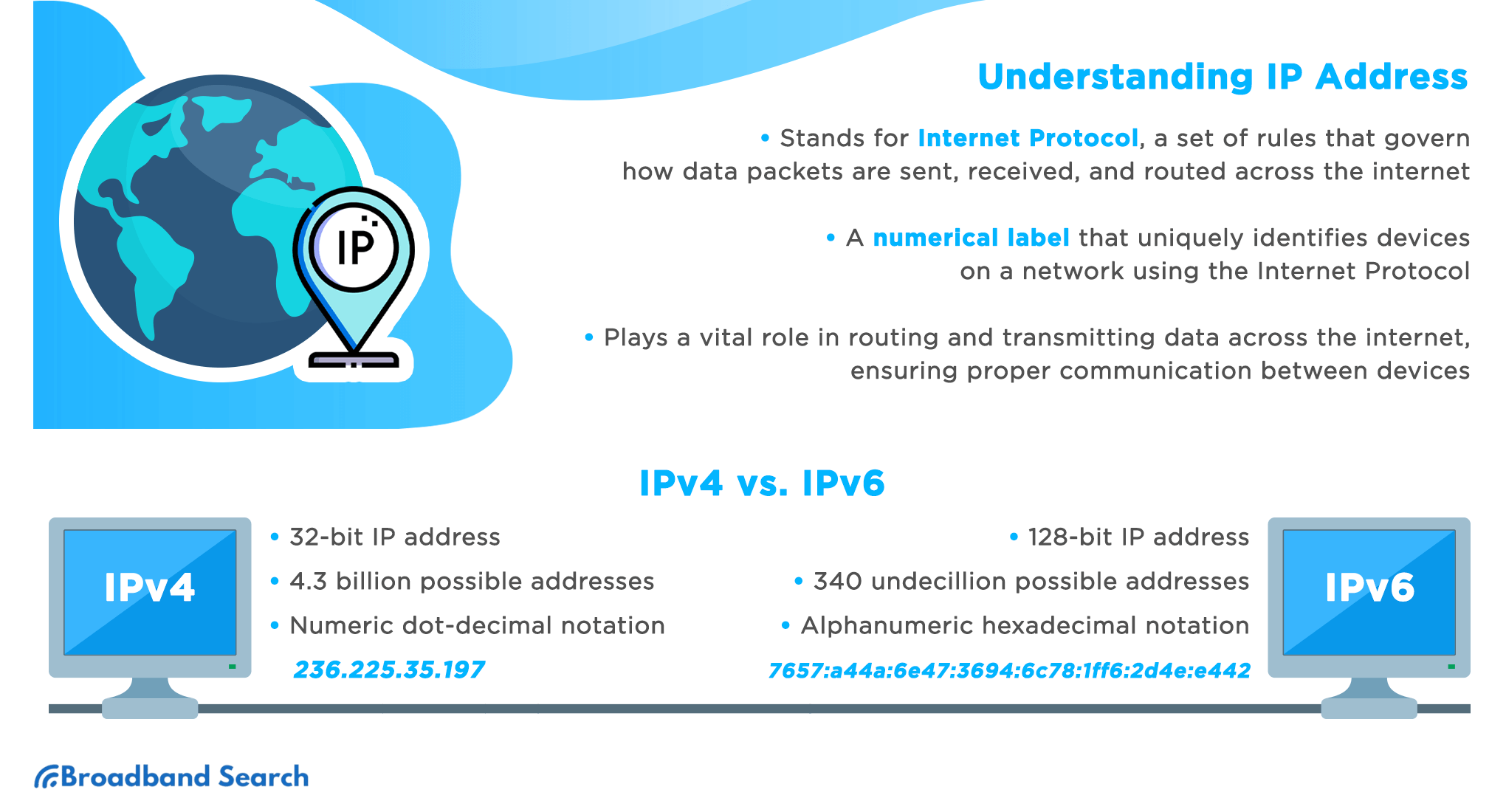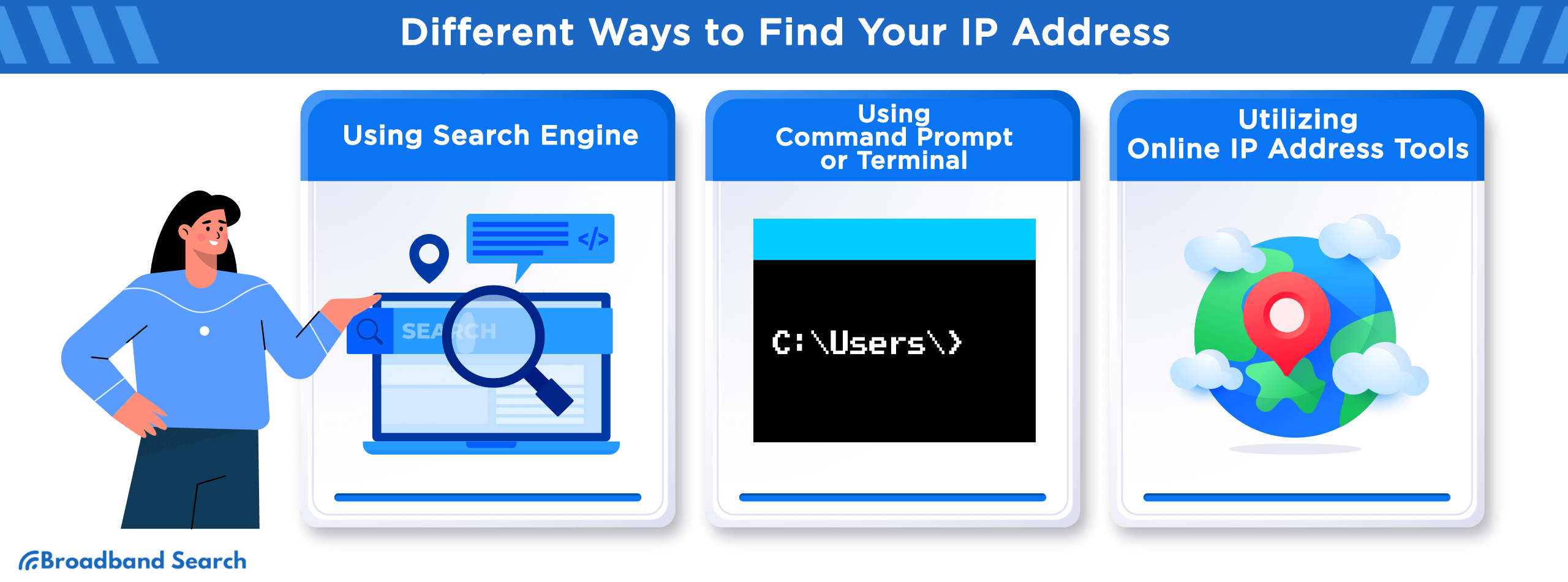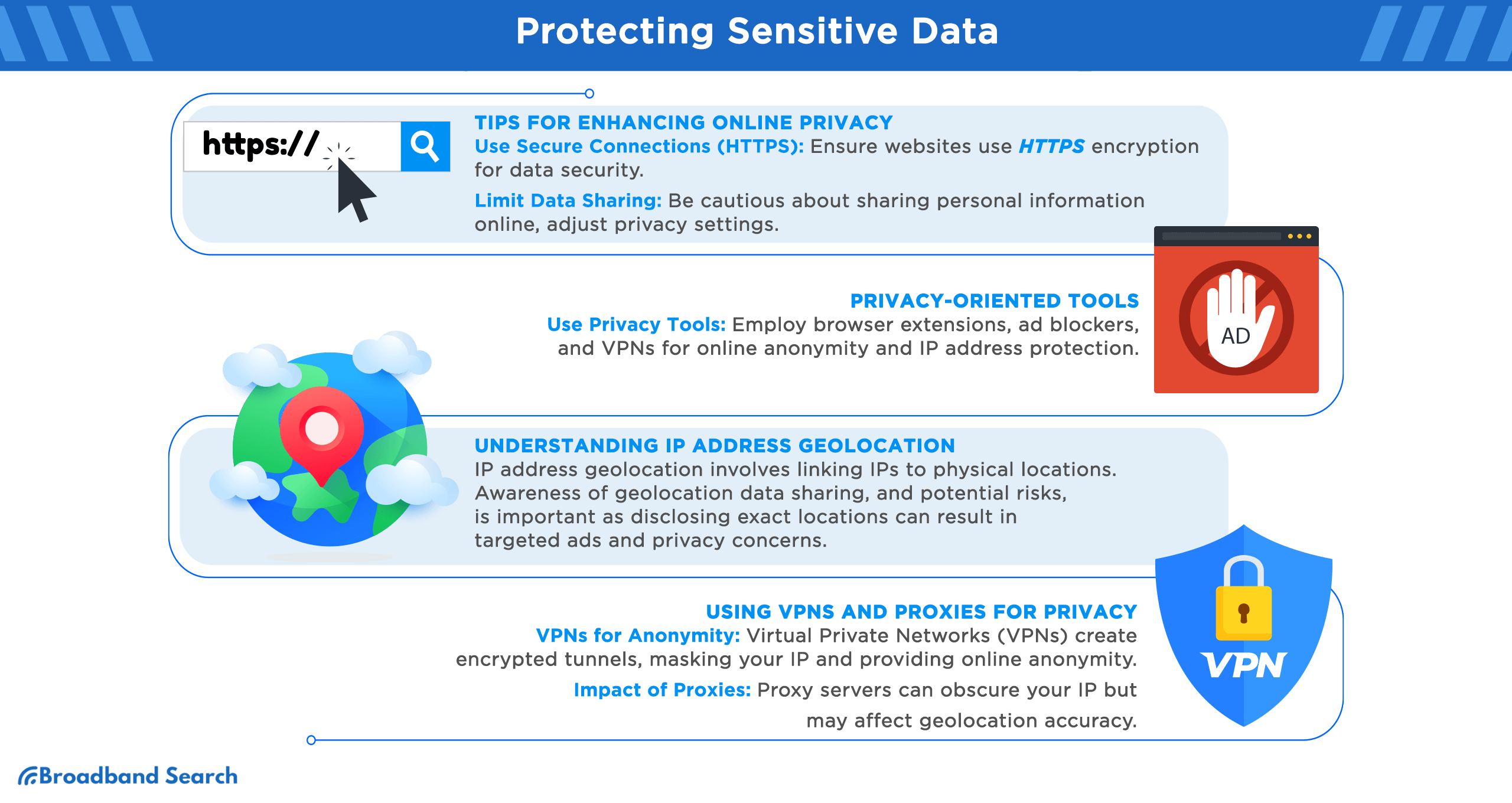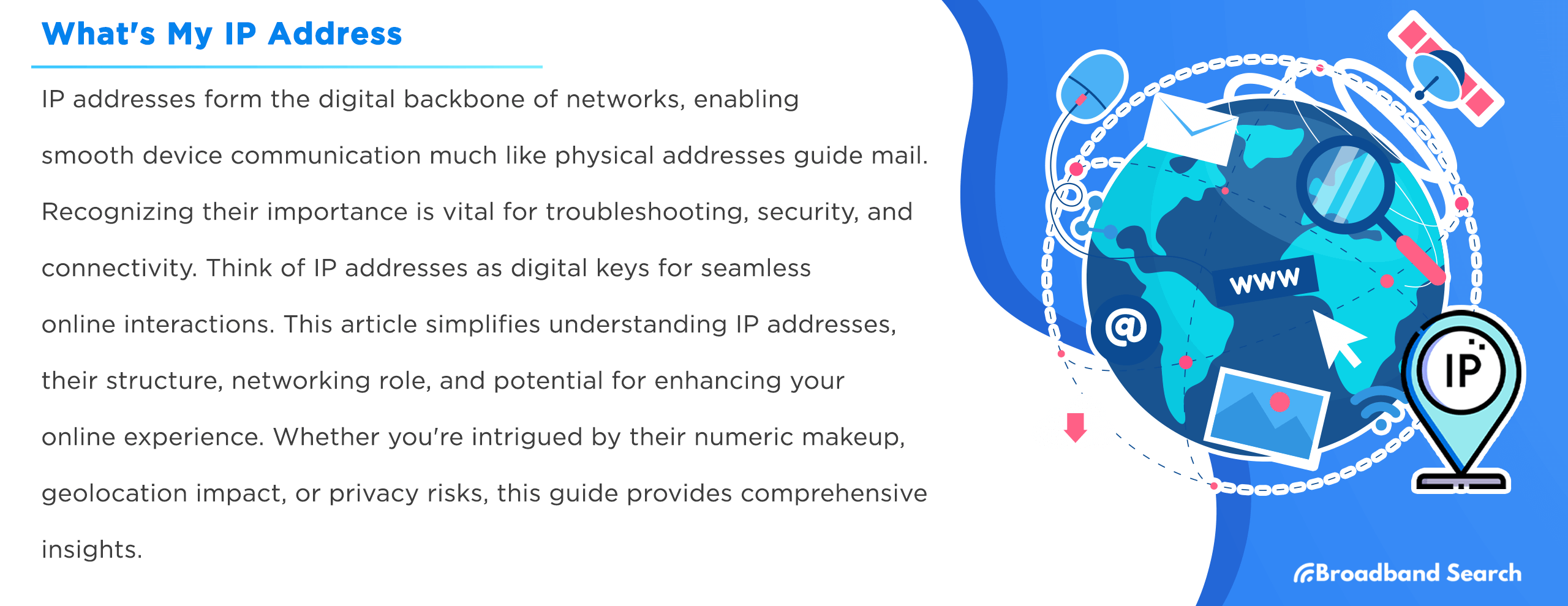In computer networks, IP addresses act as the digital backbone, enabling seamless communication between devices. Much like physical addresses guide mail, IP addresses direct data packets across the internet. Recognizing their importance is crucial for troubleshooting, securing online activities, and maintaining connectivity.
Consider IP addresses as the keys to the digital realm, facilitating your online interactions. This article aims to demystify IP addresses, empowering you to understand their structure, grasp their role in networking, and utilize their potential for an enhanced online experience. Our objective is clear: equip you with knowledge about IP addresses. Whether you're intrigued by the numerical makeup, curious about geolocation's impact, or concerned about privacy risks, this guide provides comprehensive insights.
Understanding IP Address

Definition and Structure of an IP Address
The acronym "IP" stands for Internet Protocol, a set of rules that govern how data packets are sent, received, and routed across the internet. IP addresses serve as digital labels for devices, ensuring data reaches the right destination.
An IP address consists of a series of numbers separated by periods. For example, in IPv4, it appears as "192.168.1.1." This numerical structure acts as the digital identifier for devices on a network.
IPv4 vs. IPv6
Explanation of IPv4 and Its 32-Bit Address Structure: IPv4, the fourth version of the Internet Protocol, uses a 32-bit address structure. This limits the total number of unique addresses to around 4.3 billion, a number that's increasingly insufficient as the internet expands.
Introduction to IPv6 and Its 128-Bit Address Structure: IPv6, the sixth version, was designed to address the limitations of IPv4. It employs a 128-bit address structure, allowing for a staggering number of unique addresses—approximately 340 undecillion. The expansion of address space in IPv6 accommodates the ever-growing number of devices connected to the internet.
Comparison of IPv4 and IPv6 Address Space: IPv6's significantly larger address space addresses the scarcity issue faced by IPv4. This expansive pool of addresses ensures that every device can have a unique, globally accessible IP address, fostering the growth of the internet.
Adoption Challenges and the Transition to IPv6: While IPv6 offers superior address space, its widespread adoption posed challenges due to existing IPv4 infrastructure. The transition requires coordination between ISPs, organizations, and device manufacturers to ensure compatibility and smooth migration.
How IP Addresses Are Assigned to Devices
- Role of Internet Assigned Numbers Authority (IANA) and Regional Internet Registries (RIRs): IANA and RIRs allocate IP address blocks to ISPs and organizations. This hierarchical system ensures efficient and organized distribution of IP addresses globally.
- DHCP (Dynamic Host Configuration Protocol) and Automatic IP Address Assignment: DHCP allows devices to obtain IP addresses automatically from a central server upon connection to a network. This dynamic allocation optimizes address usage and simplifies network management.
Public vs. Private IP Addresses
Public IP Addresses and Their Global Visibility: Public IP addresses are unique identifiers assigned to devices directly connected to the internet. They facilitate communication between devices across the globe and enable direct access to resources hosted on these devices.
Private IP Addresses and NAT (Network Address Translation): Private IP addresses are used within local networks to distinguish devices from one another. NAT translates personal IP addresses to a single public IP address, allowing multiple devices within a local network to share the same public IP for internet access.
Dynamic vs. Static IP Addresses
Dynamic IP Addresses: Dynamic IP addresses change periodically. ISPs assign them from a pool of available addresses, optimizing address usage across their network. While suitable for most users, dynamic addresses can change, potentially causing inconvenience for services requiring consistent IPs.
Static IP Addresses: Static IP addresses remain constant over time. They are manually configured and offer stability for web hosting and remote access services. However, static addresses can be less flexible and require additional configuration during network changes.
Finding Your IP Address

Using Search Engines
Step-by-Step Guide to Finding Your IP Address:
- Open Your Preferred Web Browser: Launch your web browser, such as Chrome, Firefox, or Safari.
- Search for "What Is My IP": In the search bar, type "What Is My IP" and press Enter. Search engines will display your IP address at the top of the results page.
- View Your IP Address: Look for the line that displays your IP address. It will typically be presented in both IPv4 and IPv6 formats.
Using IP-Specific Websites
There are dedicated websites designed solely to display your IP address when you visit them. These sites provide a quick and straightforward way to obtain your IP information.
Recommended Websites for Accurate Results:
- "WhatIsMyIP.com": This website offers IPv4 and IPv6 address information and additional details about your location and ISP.
- "IPChicken.com": A straightforward site that displays your IP address without distractions.
- "IPinfo.io": Apart from your IP address, this website provides data about your ISP, location, and technical details.
Using Command Prompt or Terminal
Instructions for Obtaining IP Address Through Command Line Tools:
For Windows
- Press the "Windows" key and "R" simultaneously to open the Run dialog.
- Type "cmd" and press Enter to open the Command Prompt.
- In the Command Prompt, type "ipconfig" and press Enter.
- Look for the "IPv4 Address" under your active network connection; this is your local IP address.
For Unix-based Systems (Linux and macOS)
- Open the Terminal from the Applications folder (macOS) or use the Ctrl+Alt+T shortcut (Linux).
- Type "ifconfig" and press Enter.
- Locate the "inet" or "inet addr" entry under your active network interface; this is your local IP address.
Utilizing Online IP Address Tools
Introduction to Various Online Tools for IP Address Lookup and Validation: Online tools are available to help you instantly identify your IP address and gather additional information, such as geolocation and ISP details. These tools provide a user-friendly interface accessible from any device with an internet connection.
Understanding the Information Provided by These Tools: When you input your IP address into these tools, they often offer details about your approximate physical location, ISP, and other technical information. Remember that while these tools can provide valuable insights, they might only be partially accurate due to factors like VPN usage or proxy servers.
Revealing Insights: Geolocation, ISP Identification, and Privacy Concerns of Your IP Address
Geolocation Databases and Physical Locations
Geolocation databases establish a connection between IP addresses and physical locations. They gather data from various sources, such as GPS, Wi-Fi, and cell towers, to pinpoint where a device is likely located. This process assists services in customizing content delivery, localizing information, and offering location-based services. The correlation between IP addresses and real-world locations highlights the role of IP addresses in deciphering user whereabouts.
Influencing Geolocation Accuracy
Several factors influence the accuracy of geolocation data. Network infrastructure, such as the density of cell towers or Wi-Fi access points, can enhance accuracy in urban areas. However, in rural regions, accuracy might decrease due to sparse network coverage. Additionally, user privacy measures, like VPNs and proxies, can obfuscate actual locations, affecting geolocation accuracy. Various technologies, such as GPS, Wi-Fi positioning, and cellular triangulation, offer differing levels of accuracy, impacting the precision of location data.
ISP-IP Address Association
ISPs allocate specific IP address ranges to their users, creating a link between IP addresses and the respective ISPs. This relationship forms the foundation for internet connectivity. ISPs determine factors like internet speed, latency, and data usage limits. The choice of ISP can influence your online experience, making it essential to select an ISP that aligns with your requirements.
ISP's Impact on Internet Experience
The ISP you choose plays a crucial role in your overall internet experience. Internet speed, reliability, and customer service quality vary among ISPs. For instance, different ISPs offer distinct rates for streaming, online gaming, or general browsing. Choosing an ISP that matches your online activities and requirements ensures a smoother and more tailored internet experience.
Risks of Geolocation Data and Addressing Privacy Issues
Geolocation data can reveal not only your approximate location but also behavioral patterns. Advertisers and service providers use this data for targeted advertising, which can lead to a loss of privacy.
To safeguard sensitive information, individuals can use VPNs to mask their IP addresses and employ privacy-focused browser extensions. Awareness of geolocation tracking empowers users to make informed choices about sharing their data and engaging with services that respect their privacy.
Protecting Sensitive Data

Tips for Enhancing Online Privacy
- Use Secure Connections (HTTPS): Ensure websites you visit use HTTPS encryption to safeguard data transmitted between your device and the website. Look for the padlock symbol in the browser's address bar.
- Limit Data Sharing: Be mindful of the information you share online, especially on social media. Limit the personal details you provide and adjust privacy settings on social platforms.
- Employ Privacy-Oriented Tools: Utilize privacy-focused browser extensions, ad blockers, and VPNs to enhance online anonymity. These tools help shield your IP address and block tracking mechanisms.
IP Address Geolocation in Action and How Geolocation Databases Work
Definition and Purpose of IP Address Geolocation
IP address geolocation is the process of associating IP addresses with physical locations. It plays a pivotal role in determining the geographic position of devices connected to the internet.
Geolocation data extends beyond mapping locations; it's a cornerstone of modern technology. From enabling location-based services to refining advertising strategies, geolocation enhances user experiences and business operations.
Diverse Use Cases and Commercial/Public Databases
Practical Applications: Geolocation data has versatile applications. Businesses use it for targeted marketing, delivering location-specific content, and customizing user experiences. Emergency services also rely on geolocation to accurately locate individuals in distress.
Commercial vs. Public Databases: Commercial databases often offer comprehensive and real-time geolocation data but come with a cost. Publicly accessible databases provide more limited data but can still serve basic geolocation needs.
Data Sources, Reliability, Accuracy, and Limitations
- Data Sources: Geolocation data is gathered from various sources, including GPS, Wi-Fi access points, cell towers, and IP address registries. These sources contribute to forming a comprehensive view of device locations.
- Reliability and Limitations: While GPS provides highly accurate location data, Wi-Fi and cell tower data offer precision at a broader scale. However, geolocation accuracy can be affected by factors like VPN usage, proxies, and network congestion. Data accuracy can vary based on the source and the environment.
- Factors Affecting Accuracy: VPNs and proxy servers can distort geolocation data by making it appear as if the device is in a different location. Network congestion and unstable connections can also impact the accuracy of data received from mobile devices.
- Inaccuracies Due to External Factors: Geolocation data might be inaccurate due to a device's physical movement or if the device connects to different networks with varying IP address ranges. Additionally, environmental obstacles can affect the precision of location data collected from cell towers and Wi-Fi access points.
Practical Applications in the Real World
Geolocation data finds real-world applications across industries:
- Advertising: Retailers use geolocation to push location-specific ads to users. For instance, a nearby coffee shop might send a promotional offer to a user in the vicinity.
- Fraud Prevention: Banks and financial institutions analyze geolocation data to identify potentially fraudulent transactions. If a user's credit card is suddenly used in a different country, it could raise a red flag.
- User Personalization: Streaming services leverage geolocation to provide region-specific content. Users see recommendations and content tailored to their geographical preferences.
- Emergency Services: Geolocation helps responders locate distressed individuals, improving response times during critical situations.
Privacy and Security Implications
How Websites and Services Use Geolocation Data
User Consent and Data-Sharing Practices: Websites and services often request access to geolocation data with user consent. This information is used to provide location-based features like localized content or services. However, it's crucial to be aware of the data-sharing practices of these platforms and understand how your information may be used.
Potential Risks of Disclosing Location Information: Disclosing precise geolocation can have unintended consequences. Advertisers can track your movements, leading to targeted ads. Additionally, revealing your location might compromise personal safety and privacy, making it vital to consider what information you share and with whom.
Protecting Your Privacy and Hiding Your IP Address
Using VPNs (Virtual Private Networks): VPNs create encrypted tunnels between your device and a server, masking your IP address and routing your internet traffic through the server. This shields your online activities from prying eyes and can provide anonymity by making it appear like you're accessing the internet from a different location.
Proxy Servers and Their Impact on Geolocation Accuracy: Proxy servers act as intermediaries between your device and the internet. While they can obscure your IP address, they can also impact geolocation accuracy. Some proxies reveal their location, affecting the accuracy of location-based services.
Understanding the Role of VPNs and Proxies
Comparison of VPNs and Proxies: Functionality and Privacy
VPNs offer comprehensive privacy by encrypting and routing your data through secure servers. They hide your IP address and safeguard your online activities from surveillance. Proxies, conversely, primarily conceal your IP and can help bypass certain restrictions, but they may provide a different level of security and encryption.
Best Practices for Choosing and Using VPNs or Proxies
- Research: Look for VPNs/proxies with a strong reputation for privacy and security.
- Server Locations: Choose a provider with servers in locations important to you, enhancing your browsing experience.
- Encryption: Opt for VPNs with robust encryption protocols to ensure your data remains private.
- Logging Policy: Choose providers with strict no-logs policies, ensuring your online activities aren't stored.
- Ease of Use: Select a service with user-friendly interfaces and clear setup instructions.
The Bottom Line
In the ever-evolving digital landscape, the significance of IP addresses extends beyond connectivity—it's a gateway that malicious actors can exploit. Hackers and cybercriminals employ various methods to track IP addresses, gaining access to sensitive data and compromising online security. Vigilance is vital in detecting and safeguarding against IP-based threats. By implementing robust cybersecurity practices, such as using firewalls, keeping software up to date, and being cautious of suspicious links, we fortify our defenses against potential breaches.
The ethical landscape of geolocation data collection raises important questions. The examination of its legality and ethics highlights the importance of responsible practices. Adhering to data protection regulations and embracing best practices ensures that the gathering and utilizing of geolocation information are transparent, respectful of privacy rights, and conducted with the utmost integrity.
Protecting online privacy and security is a shared responsibility. We encourage users to take proactive steps to safeguard their personal information. Utilize secure connections, limit data sharing, and leverage privacy-oriented tools like VPNs to anonymize IP addresses. By being informed and taking practical actions, we empower ourselves to navigate the online world with confidence, resilience, and a commitment to preserving our digital well-being.
FAQ
What is the significance of IP addresses in computer networks?
IP addresses are essential in computer networks as they serve as digital labels for devices, enabling communication and data exchange across the internet. They are the equivalent of physical addresses, guiding data packets to their destinations.
How do hackers use IP address tracking?
Hackers can use IP address tracking to access sensitive information, launch cyber attacks, or compromise online security. They exploit vulnerabilities to track and trace users' digital activities.
How can I detect and protect against IP-based threats?
To detect and protect against IP-based threats, use firewalls, keep your software updated, and be cautious of suspicious links. Regularly monitor your online activities for any signs of unauthorized access.
What are the legal and ethical considerations of geolocation data?
Geolocation data usage should adhere to data protection regulations and ethical practices. Respecting privacy rights, complying with relevant laws, and ensuring transparent handling of users' location information is essential.
How can I empower myself to safeguard my online privacy and security?
Empowerment starts with awareness. Stay informed about IP address tracking methods, geolocation data usage, and cybersecurity practices. Implement best practices, such as using secure connections, privacy-oriented tools, and responsible data sharing, to enhance online safety.

